Past Events
Interested in Cotsen events? Sign up for our mailing list.Anthony Caldwell, Assistant Director of the UCLA Digital Research Consortium
Thursday, July 23rd 2020 10:00am - 12:00pm (PT)
This workshop will introduce 3D modeling through the use of SketchUp, an intuitive modeling application that lets you create and edit 3D models. The workshop will cover: navigating and understanding 3D space, drawing basics, textures, tags, importing and exporting, and much more.
Note: This workshop will be using Sketch-up free. If you would like to follow the workshop, please make sure you have signed up for a SketchUp free account at https://www.sketchup.com/plans-and-pricing/sketchup-free
Contact Deidre Whitmore
Email dal@ioa.ucla.edu
Phone
Caroline Arbuckle MacCleod, Ph.D. Fellow, University of British Columbia
Wednesday July 22, 2020 – 1:00pm
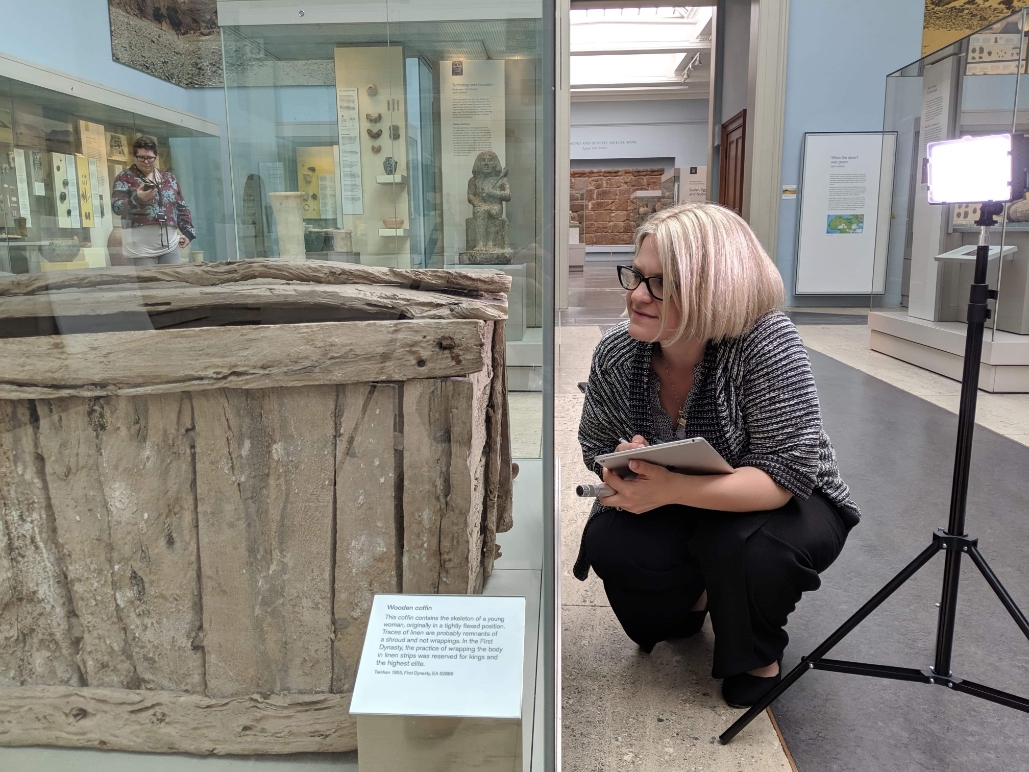 In ancient Egypt, the wooden coffin was considered one of the fundamental elements of a burial for wealthier individuals. It was a magical vessel that protected the deceased, and ensured that the owner could be transformed into a divine being in the afterlife. Due to the importance of these objects, potent magical talismans and symbols were placed around and in the coffin, and were often included in the decoration. Magical spells and rituals were also performed throughout the burial ceremony. In this talk, a new layer of ritual and magic is considered, hidden within the invisible joints of wooden coffins. In these areas, secret spells and magical red paint were added during construction. This may suggest the presence of educated carpenter priests, trained in the rituals needed to prepare the wood, as the first step in the creation of these potent vessels for the dead.
In ancient Egypt, the wooden coffin was considered one of the fundamental elements of a burial for wealthier individuals. It was a magical vessel that protected the deceased, and ensured that the owner could be transformed into a divine being in the afterlife. Due to the importance of these objects, potent magical talismans and symbols were placed around and in the coffin, and were often included in the decoration. Magical spells and rituals were also performed throughout the burial ceremony. In this talk, a new layer of ritual and magic is considered, hidden within the invisible joints of wooden coffins. In these areas, secret spells and magical red paint were added during construction. This may suggest the presence of educated carpenter priests, trained in the rituals needed to prepare the wood, as the first step in the creation of these potent vessels for the dead.
Please note, the talks will start at 1:00pm PT during the summer.
Contact Michelle Jacobson
Email mjacobson@ioa.ucla.edu
Phone
Deidre Whitmore, Digital Archaeology Lab
Thursday, July 16th 2020 10:00am - 12:00pm (PT)
Vector illustrations are common in archaeological publications and field documentation. In this workshop we'll cover how Adobe Illustrator and vector illustrations can be used for site maps, trench and elevation drawings, and artifact renderings. Participants will be introduced to the interface and tools associated with these types of illustrations. We'll cover how to bring scanned drawings into Illustrator and set up a drawing for digital tracing as well as tricks to speed up the process. Additionally, we'll walk through creating artifact drawings using common techniques including stippling.
Register here (Registration is limited to Cotsen affiliates)
Contact Deidre Whitmore
Email dal@ioa.ucla.edu
Phone
Alan Farahani, Assistant Professor in Anthropology, University of Nevada, Las Vegas
Thursday, July 9th 2020 10:00am - 12:00pm (PT)
This workshop will cover the basics of contemporary data manipulation using the R statistical programming language as well as provide an introduction to approaches to regression for archaeological applications. Topics covered will include philosophy of regression, model specification, parameterization, and evaluation, as well as the different distribution families used to analyze count (poisson, negative binomial, etc.) and continuous (gaussian) data. Participants should walk away (aka turn off their web cameras) with at least a basic understanding of the issues as well the ability to undertake some of the analyses using the R platform.
Register here (Registration is limited to Cotsen affiliates)
Contact Deidre Whitmore
Email dal@ioa.ucla.edu
Phone
Anthony Caldwell, Assistant Director of the UCLA Digital Research Consortium
Thursday, July 2nd 2020 10:00am - 12:00pm (PT)
Photogrammetry, or Structure-from-Motion, is a technique for constructing three dimensional models from a series of photographs. This technique can be utilized by archaeologists to record objects, features, and sites both quickly and relatively inexpensively. In this workshop, you'll learn how to systematically photograph objects and the steps to processing these photographs into a 3D model with Agisoft's MetaShape (previously named PhotoScan).
Register here (Registration is limited to Cotsen affiliates)
Contact Deidre Whitmore
Email dal@ioa.ucla.edu
Phone
Vanessa Muros, Director of the Experimental and Archaeological Sciences Lab
Thursday, June 25th 2020 10:00am - 12:00pm (PT)
Portable x-ray fluorescence (XRF) spectroscopy has become a widely used analytical tool in the fields of archaeology and conservation for the non-destructive elemental analysis of cultural heritage materials. But once you've collected your data, how do you interpret it? This workshop will provide a general introduction to the three types of pXRF data that can be generated (qualitative, quantitative, and semi-quantitative) and through the use of case studies, illustrate how the data can be interpreted and used to answer research questions about cultural heritage.
Register here (Registration is limited to Cotsen affiliates)
Contact Deidre Whitmore
Email dal@ioa.ucla.edu
Phone
We are excited to announce that our event Chauvet Cave: Masterworks of the Paleolithic will now be held virtually!
In conjunction with the global digital film premiere of The Final Passage, a 28-minute immersive experience of the Chauvet-Pont d’Arc Cave and its paintings, the Cotsen Institute of Archaeology will be hosting a virtual discussion and Q&A session with Jean-Michel Geneste, General Curator of Cultural Heritage for the Ministry of Culture in France and former curator of the Lascaux caves, and the film’s producer, Martin Marquet. Participants are invited to watch the film online prior to the event. Questions can be submitted in advance when registering or during the event.
Since its discovery in 1998, the extraordinary rock art of the Chauvet-Pont d’Arc cave in south-central France has been celebrated for its remarkable realism and demonstration of skill never before seen in cave art. Dating back 36,000 years, the myriad paintings of horses heads, mammoths, bears, cave lions, rhinoceroses and more use “the knobs, recesses, and other irregularities of the limestone to impart a sense of dynamism and three-dimensionality to their galloping, leaping creatures,” according to Smithsonian magazine.

(only available from May 7 - June 7)

Wednesday, May 27, 2020
12:00 - 1:00 PM
Space is limited. Please register by May 25.
This event is co-sponsored by the UCLA Rock Art Archive. Email Michelle Jacobson at mjacobson@ioa.ucla.edu for more information.

Contact Michelle Jacobson
Email mjacobson@ioa.ucla.edu
Phone 310-825-4004
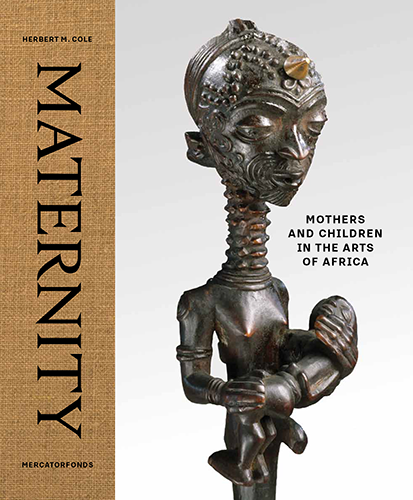 SPEAKER:
SPEAKER:
Dr. Herbert Cole
University of California, Santa Barbara
Professor Emeritus, Art History
In writing my latest (and probably last) book: Maternity: Mothers and Children in the Arts of Africa, two stereotypes emerged that I ran into more or less often as I researched the topic, and these ended up as "pet peeves" that I felt the need to address in my text: "fertility goddess" as a descriptor of Africn images of mothers with children, especially those shown suckling, and the word "doll" as applied to images of children used by many potential mother to help them conceive, or if pregnant, to make sure the pregnancy goes well and a healthy, handsome child is born. I will explore both of these stereotypes and show that both are ultimately racist words when applied to maternity and child images.
Suggested reading for the talk available here.
Register for this Cotsen Virtual Pizza Talk here! You will receive instructions on viewing the talk after registering.
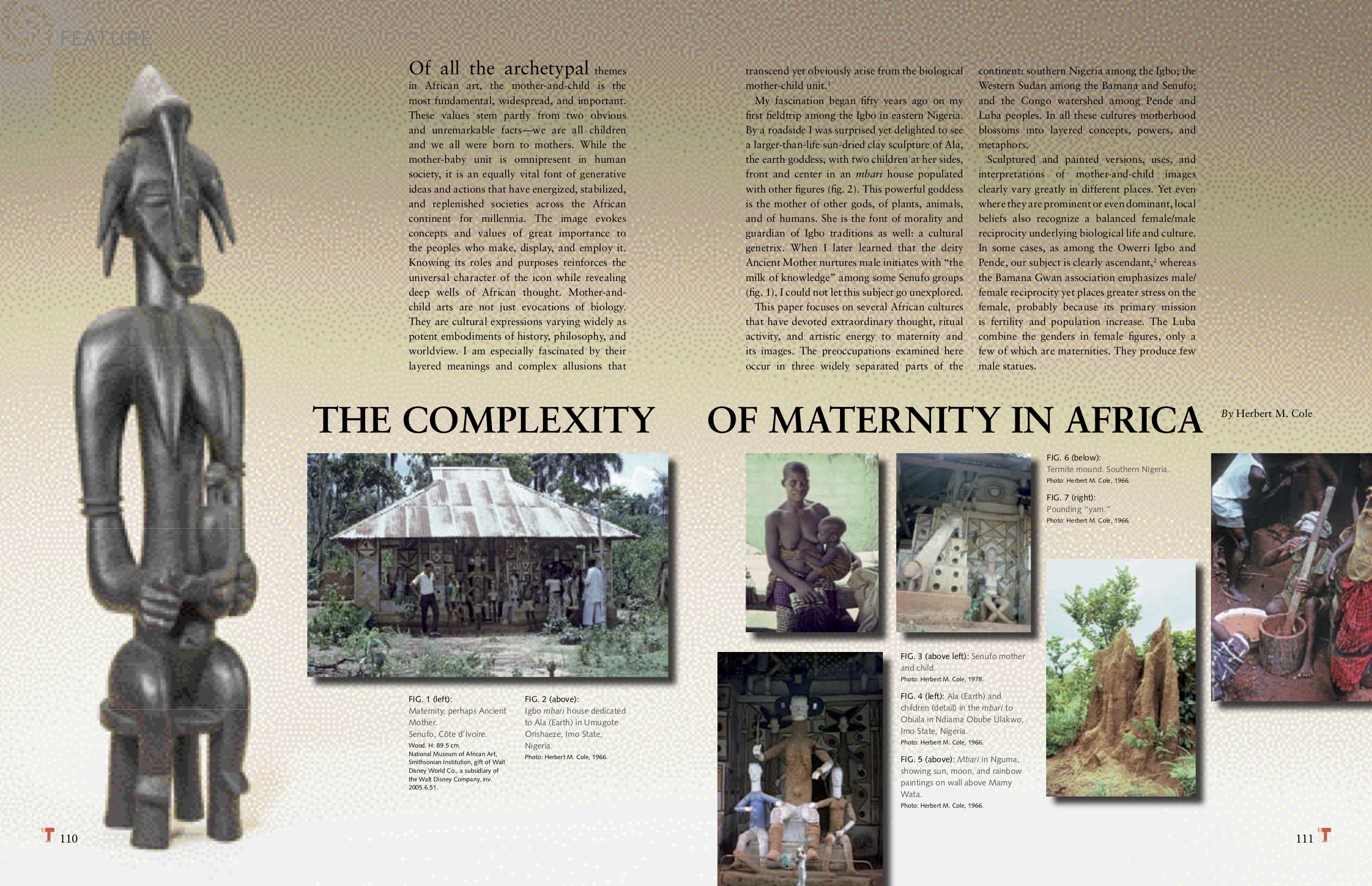
Contact Michelle Jacobson
Email mjacobson@ioa.ucla.edu
Phone
SPEAKER:
Rosemary A. Joyce
Professor and Chair of Anthropology
University of California, Berkeley
This talk builds on feminist scholarship criticizing a tacit distinction between household labor (as intimate, domestic, and ruled only by naturalized relations of sex and age) and extra-domestic labor to help advance understanding of gender and labor in societies of ancient Central America. Household production, the role of specific products of women's labor as standards of value and media of exchange, and the role of indigenous ontologies in which material animacy and animating spirits occupied central places in exchanges we might otherwise think of as economic will be considered.
Full abstract:
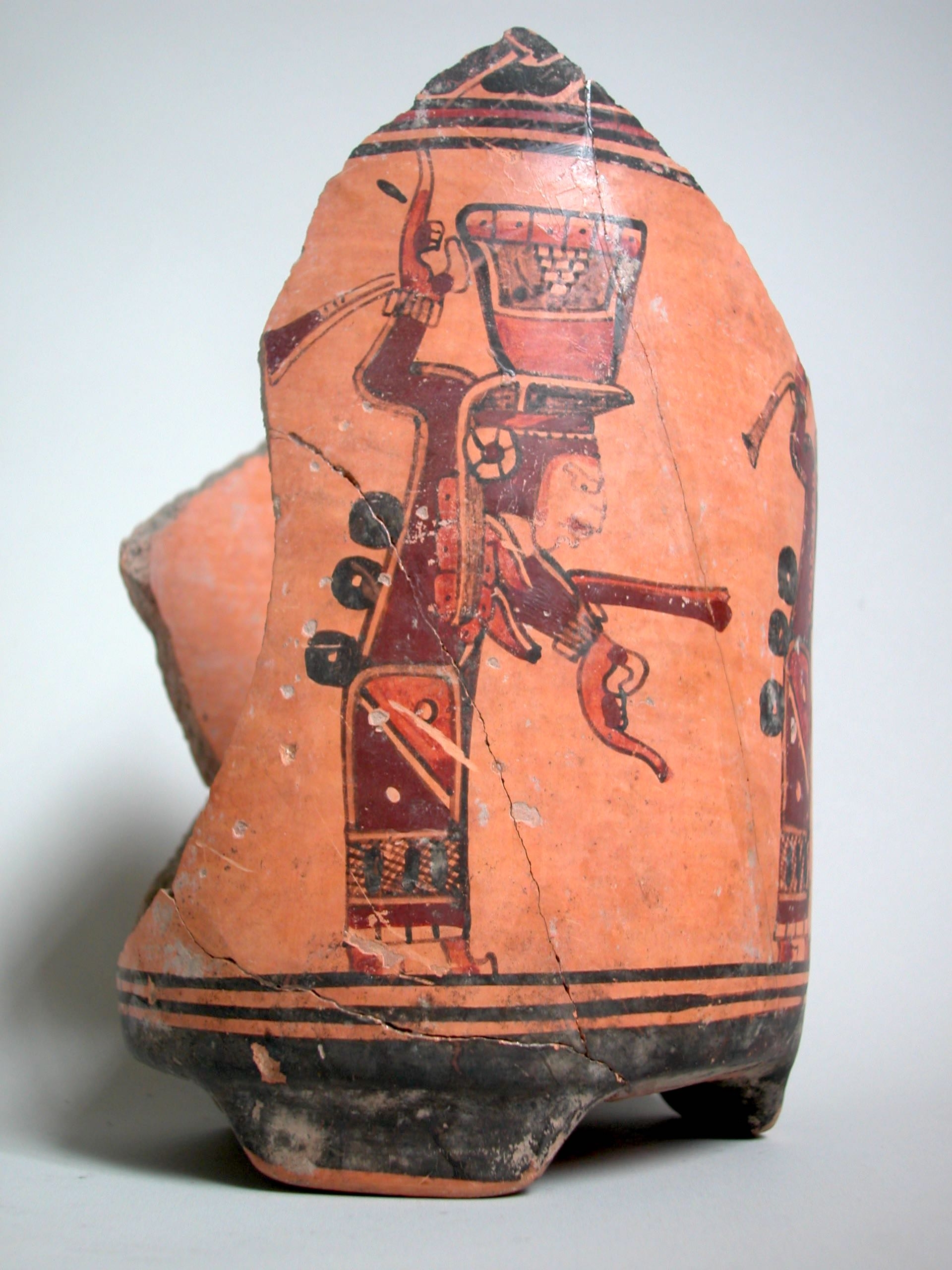 As renewed interest in inequality sparks a turn to the archaeologically documented past as a source of data for generalizing models explaining the roots of the contemporary economic reality, it is worth pausing to question how pasts that were shaped under far different social conditions can be treated as equivalent to the contemporary world of nation states and global economies. In this paper, I examine three sources of incommensurability that should be taken into account in any attempt to think from the past of economic relations to the present. The first of these examines how labor is conceived of, counted, and understood in these different situations. As feminist scholars of the contemporary economy have long noted, large areas of economic activity by women are routinely excluded in modern analyses. Such household maintenance work rests on a tacit distinction between household labor (as intimate, domestic, and ruled only by naturalized relations of sex and age) and extra-domestic labor. For the societies of ancient Central America, such a division simply did not exist. Not only did a large part of the organization of agricultural labor build on household relations; women's specialist craft production, in particular, was critical to economic relations. This leads to the second aspect of incommensurability that I consider: the identification and mobilization of standards of value and exchange. In these societies, cloth produced by women working in domestic spaces was one of the enduring standards of value, specifically important in tribute payments that established and perpetuated political hierarchies. Cloth's use in this fashion cannot be disentangled from the social relations in which it was embedded. Nor can the social relations which gave value to other key media used to measure value in economic exchanges be equated, even when the same social agents, women, have key roles in production, for example, in the cultivation of cacao, a second standard of value. By considering these two media, and the way that they relate to women's economic activities extending from domestic space to cosmopolitan marketplaces, I identify a third contradiction to conceptualizing the ancestral Central American economy in terms drawn from the current situation: the important of ideologies of material animacy and the role of animating spirits in exchanges we might otherwise think of as economic.
As renewed interest in inequality sparks a turn to the archaeologically documented past as a source of data for generalizing models explaining the roots of the contemporary economic reality, it is worth pausing to question how pasts that were shaped under far different social conditions can be treated as equivalent to the contemporary world of nation states and global economies. In this paper, I examine three sources of incommensurability that should be taken into account in any attempt to think from the past of economic relations to the present. The first of these examines how labor is conceived of, counted, and understood in these different situations. As feminist scholars of the contemporary economy have long noted, large areas of economic activity by women are routinely excluded in modern analyses. Such household maintenance work rests on a tacit distinction between household labor (as intimate, domestic, and ruled only by naturalized relations of sex and age) and extra-domestic labor. For the societies of ancient Central America, such a division simply did not exist. Not only did a large part of the organization of agricultural labor build on household relations; women's specialist craft production, in particular, was critical to economic relations. This leads to the second aspect of incommensurability that I consider: the identification and mobilization of standards of value and exchange. In these societies, cloth produced by women working in domestic spaces was one of the enduring standards of value, specifically important in tribute payments that established and perpetuated political hierarchies. Cloth's use in this fashion cannot be disentangled from the social relations in which it was embedded. Nor can the social relations which gave value to other key media used to measure value in economic exchanges be equated, even when the same social agents, women, have key roles in production, for example, in the cultivation of cacao, a second standard of value. By considering these two media, and the way that they relate to women's economic activities extending from domestic space to cosmopolitan marketplaces, I identify a third contradiction to conceptualizing the ancestral Central American economy in terms drawn from the current situation: the important of ideologies of material animacy and the role of animating spirits in exchanges we might otherwise think of as economic.
Register for this Cotsen Virtual Pizza Talk here! You will receive instructions on viewing the talk after registering.
Contact Michelle Jacobson
Email mjacobson@ioa.ucla.edu
Phone
SPEAKER:
Alessandro Vanzetti
University of Rome “La Sapienza”, Italy
Associate Professor in Pre- & Protohistory
Short-term Visiting Scholar
The lecture will present the main evidence for the symbolic representation of the celestial domain in the European Bronze Age, with some extension to the former Late Neolithic (also named Copper Age) and to the ensuing Iron Age. An iconographic analysis is necessary in order to decode (or try to) the representations.
In order to do it, we should consider the way in which 3-dimensional space is represented, for the production of symbolic images.
The discussion involves both phenomenological, conceptual, cognitive and religious aspects, often difficult to disentangle.
A simple grammar of the representations, of their rules and occurrences, can help, but it is still only a starting point for further insights
Register for this Cotsen Virtual Pizza Talk here! You will receive instructions on viewing the talk after registering.
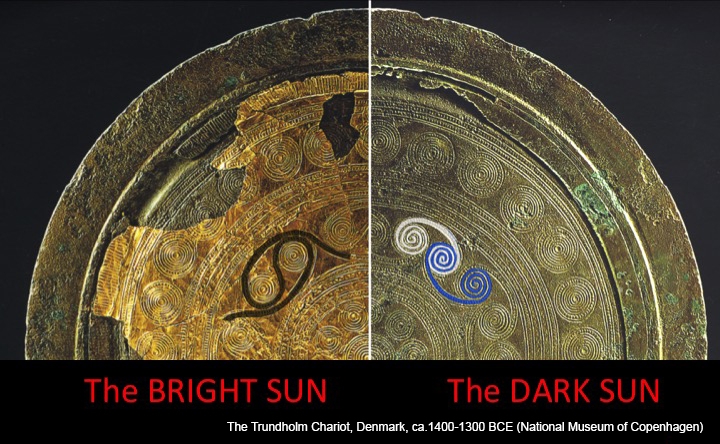
Contact Michelle Jacobson
Email mjacobson@ioa.ucla.edu
Phone
- ‹ previous
- 22 of 50
- next ›


